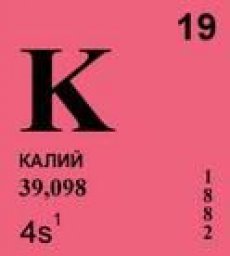Medical expert of the article
New publications
Potassium
Last reviewed: 04.07.2025

All iLive content is medically reviewed or fact checked to ensure as much factual accuracy as possible.
We have strict sourcing guidelines and only link to reputable media sites, academic research institutions and, whenever possible, medically peer reviewed studies. Note that the numbers in parentheses ([1], [2], etc.) are clickable links to these studies.
If you feel that any of our content is inaccurate, out-of-date, or otherwise questionable, please select it and press Ctrl + Enter.

Potassium (K) is very important for the body. Potassium is contained in the walls of cells and capillaries; the liver, endocrine glands, nerve cells cannot function normally without its deficiency. Did you know that potassium is contained in 50% of all body fluids?
What You Need to Know About Potassium
Potassium, together with chlorine (Cl) and sodium (Na), is the element that is most needed in our body. The amount of potassium is 250 g, of which only 3 g are part of the extracellular fluids. Potassium is the main element in plant products.
Daily potassium requirement
Every day we should consume 3 to 5 g of potassium with food.
Under what conditions does the need for potassium increase?
If you are doing intense physical activity and sports, you should increase the amount of potassium that enters your body with food. If you are taking diuretics or sweating heavily (they can lead to loss of potassium), you should consume more foods containing potassium.
The beneficial properties of potassium when it affects the body
Potassium, with the help of chlorine (Cl) and sodium (Na), participates in maintaining the salt balance of cells, ensures the balance of fluids in the cells and tissues of the body, and maintains normal osmotic pressure in cells. Potassium contributes to the alkalizing effect in maintaining the acid-base balance together with sodium (Na), magnesium (Mg) and calcium (Ca).
When there is a lack of potassium, glucose cannot be converted into energy, so the muscles stop contracting and freeze, thereby causing complete paralysis.
Thanks to potassium, the heart rate is controlled, blood pressure is regulated, nerve impulses are transmitted normally, and all muscle groups are contracted. With its help, fluids are removed from the body, it ensures the absence of depression, supplies brain cells with oxygen, removes toxins, and protects against strokes. The role of potassium in the body is practically priceless!
In all processes of the body, potassium participates together with sodium (Na), or rather in one combination (sodium antagonist), and in order for your body to be completely healthy, their ratio should be 1:2. If you have an increased amount of sodium, then its negative impact can be weakened by taking additional amounts of potassium.
Potassium absorption
Potassium is perfectly absorbed through the walls of the stomach and intestines, and is excreted in the urine. Almost the same amount of potassium is excreted as was consumed.
Signs of Potassium Deficiency in the Body
Insufficient potassium intake can cause swelling, drowsiness, and apathy. Due to impaired muscle function, people often have cramps and feel muscle weakness. The heart rhythm can also be disrupted, causing arrhythmia. Frequent vomiting and constipation are a clear sign of potassium deficiency in the body. According to statistics, the likelihood of death from a stroke in men increases by 3 times if the potassium level in the body is low.
Signs of excess potassium
Obvious signs of excess potassium in the body include: excitability, heart problems, loss of sensitivity in the extremities, increased urination. Arrhythmia may occur with both a deficiency and an excess of potassium.
What affects potassium levels in the body?
When cooking or soaking food in water, potassium moves into it. If this water is not used later, then all the potassium is lost along with it.
Why does excess potassium occur in the body?
Excess potassium in the body occurs when the kidneys or adrenal glands, which excrete excess potassium in the urine, are not functioning properly. If a person takes potassium-containing drugs or uses a substitute for table salt, they may have excess potassium.
Why does potassium deficiency occur?
Potassium deficiency can occur when taking sodium-containing drugs, as well as when consuming excessive amounts of table salt. Potassium deficiency can be caused by eating foods containing only sodium (Na) and ignoring foods containing potassium.
Potassium can also be lost if food is not prepared properly. The use of adrenal cortex hormones, diuretic herbs and drugs can significantly reduce potassium levels in the body and, accordingly, raise sodium (Na) levels.
Coffee promotes the removal of potassium from the body, so if you drink it often, take the trouble to provide yourself with additional potassium. Alcohol is also on the list of "substances that remove potassium." Stress tends to retain sodium (Na), and the amount of potassium in the body decreases.
Foods Rich in Potassium
Everyone loves sweets, but not everyone knows that such sweets as dried apricots, raisins or prunes are very rich in potassium (from 860 to 1700 mg). Nuts join them: walnuts contain 474 mg of potassium, peanuts - 658 mg, cashews - 553 mg, almonds - 748 mg, pine nuts - 628 mg. Regular potatoes contain about 568 mg of potassium, and mustard - as much as 608 mg. All these products should be consumed to maintain the balance of potassium in the body.
Interaction of potassium with other elements
If you increase your potassium intake, more sodium (Na) will be excreted. If you have a magnesium (Mg) deficiency, potassium absorption may be impaired.


 [
[